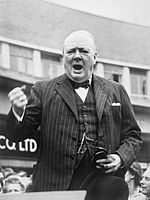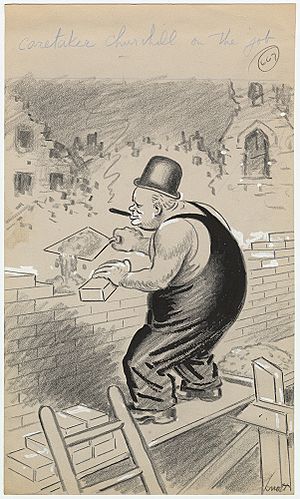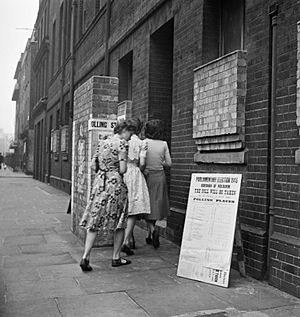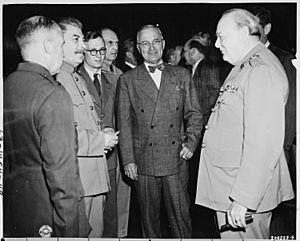Churchill caretaker ministry facts for kids
Quick facts for kids Churchill caretaker ministry |
|
|---|---|
Cabinet of the United Kingdom |
|
| May–July 1945 | |

Winston Churchill speaking on 27 June 1945
during the general election campaign |
|
| Date formed | 23 May 1945 |
| Date dissolved | 26 July 1945 |
| People and organisations | |
| Monarch | George VI |
| Prime Minister | Winston Churchill |
| Prime Minister's history | 1940–1945 |
| Deputy Prime Minister | None appointed |
| Total no. of members | 92 appointments |
| Member parties |
|
| Status in legislature | Majority (coalition) |
| Opposition party | Labour Party |
| Opposition leader | Clement Attlee |
| History | |
| Outgoing election | 1945 general election |
| Legislature term(s) | 37th UK Parliament |
| Predecessor | Churchill war ministry |
| Successor | Attlee ministry |
The Churchill caretaker ministry was a short-term British government. It lasted from 23 May to 26 July 1945. This was right at the end of World War II. Winston Churchill, the leader of the Conservative Party, was the prime minister.
This government took over from a special wartime government. That earlier government was a "national coalition" formed in 1940. It included leaders from the Conservative, Labour, and Liberal parties. This coalition ended after Nazi Germany was defeated. The parties couldn't agree on whether to keep working together until Japan was also defeated.
The caretaker government kept fighting the war against Japan in Asia. But Churchill also focused on getting ready for the Potsdam Conference. There, he would meet Joseph Stalin and Harry Truman. Back home, the main goal was to rebuild Britain after the war. This included improving education, health, housing, and social care. The different political parties campaigned on these issues for the upcoming general election. This was the first election in the UK since 1935. The election was on 5 July. But votes from soldiers overseas took time to collect. So, the results weren't announced until 26 July. Labour won by a huge amount. Churchill then resigned, and Clement Attlee became the new prime minister.
Contents
How the Caretaker Government Started
The End of the Wartime Coalition
The 1935 election had given the Conservative Party a big win. Stanley Baldwin became Prime Minister. In 1937, Neville Chamberlain took over. He tried to avoid war with Germany, Italy, and Japan. But after signing an agreement with Hitler in 1938, Chamberlain became worried. In 1939, he promised to support Poland if Germany attacked.
Britain declared war on Nazi Germany on 3 September 1939. Chamberlain formed a wartime government. Winston Churchill joined it as the head of the Navy. Many people became unhappy with Chamberlain's leadership in 1940. This was after Germany successfully invaded Norway.
The House of Commons held a debate about Norway. At the end, the Labour Party called for a vote of no confidence in Chamberlain. His government still won the vote. But their majority was much smaller. This was a big blow for Chamberlain.
Two days later, on 10 May, Germany invaded the Netherlands and Belgium. Chamberlain thought about resigning. But he felt it was the wrong time to change leaders. Later that day, the Labour Party said they would not join a government led by Chamberlain. But they would join if another Conservative became prime minister. Chamberlain then resigned. He advised the King to choose Churchill as his replacement.
Churchill quickly formed a new government. It included important members from the Labour and Liberal parties. This government stayed strong despite some tough times. Working with the Soviet Union and the United States, Britain finally defeated Nazi Germany.
Discussions About Continuing the Government
In October 1944, Churchill spoke to the House of Commons. He wanted to extend Parliament for another year. This was until Germany and Japan were defeated. There hadn't been a general election since 1935. Churchill wanted to hold one as soon as the fighting stopped. He believed Germany would be defeated by summer 1945. He said the end of the war with Germany would set the date for the next election.
In April 1945, with victory in Europe very close, Churchill met Clement Attlee. Attlee was his deputy prime minister and the leader of the Labour Party. They talked about the future of their shared government. Attlee was going to America on 17 April for a conference. Churchill promised Parliament would not be dissolved while Attlee was away.
After VE Day on 8 May, Churchill changed his mind. He decided to suggest keeping the government together until Japan was defeated. But Labour's Herbert Morrison had already published a plan for the election. It was like a party promise list. Other Conservatives also started making speeches.
On 11 May, Churchill met Morrison and Ernest Bevin. He told them he wanted to keep the government until Japan was defeated. But Labour's leaders said the election should happen in October. This was because they thought the war with Japan might last another 18 months. Also, a new list of voters would be ready by October.
Labour refused to keep the government going past October. So, Churchill's own party members urged him to call an election in June or July. They wanted to use Churchill's popularity as "the man who won the war." Labour, however, wanted Churchill's popularity to calm down.
Attlee returned from America on 16 May. He met Churchill that evening. Attlee personally wanted to continue the government. But he knew most Labour members disagreed. Churchill tried to find a middle ground. He wrote a letter to Labour's committee. It included a promise for social improvements. But it wasn't enough.
On 20 May, Labour's committee voted for an October election. Their decision was strongly supported by other Labour members. Attlee told Churchill the news. This caused some disagreement between them.

On 23 May, Churchill officially resigned to King George VI. He then went back to Downing Street. This was to make it seem like the King had a free choice for the next government. The King then asked Churchill to form a new government. This government would last until the general election results were known. Churchill accepted.
It was decided that Parliament would close on 15 June. The election would be held on 5 July. Many soldiers were still overseas. So, votes would not be counted until 26 July. This allowed time to collect all the service votes.
Forming the Caretaker Government
Churchill's new government was officially called the National Government. But people often called it the Caretaker Ministry. The official name suggested it was a continuation of the Conservative-led government from the 1930s. This was because it was mostly made up of Conservatives. It also included the smaller Liberal National party and some other individuals.
Churchill finished choosing his Cabinet by 26 May. He then gave his first election speech. He talked about the "caretaker" name. He said: "They call us 'the Caretakers'; we agree with the title. It means we will take good care of everything that helps Britain and all its people." Churchill was formally reappointed prime minister by the King on 28 May.
The Labour and Liberal parties became the opposition. But one Liberal member, Gwilym Lloyd George, stayed in Churchill's government. He continued as Minister of Fuel and Power. Churchill had to replace all the other Labour and Liberal ministers. But he didn't make big changes to how the government was set up. Only two new positions were created.
What the Government Did at Home
The caretaker government was very short. Parliament met only 14 times from 29 May to 15 June. On 7 June, Churchill refused to share everything discussed at the Yalta Conference. But he said there were no secret agreements.
A total of 27 new laws were approved on 15 June. These laws had been planned during the war. One important law was the Family Allowances Act 1945. This was the first UK law to provide child benefit. It gave money to families for their children. This was a tribute to Eleanor Rathbone, who had worked for this for over thirty years.
The government also watched over rationing. This was managed by the Ministry of Food. On 27 May, some changes were made. The amount of bacon and cooking fat people could buy was cut. The soap ration was also cut, except for babies. But on 1 June, there was good news for drivers. The basic petrol ration for civilians was brought back. It had been stopped in 1942. Most food and clothing items were still rationed, just like during the war.
The caretaker government didn't have much time to start new big projects. They mostly kept things running. They also tried to convince voters that they would fix things after the election. A key part of the Conservative plan was a Four-Year Plan. This plan called for creating the National Health Service (NHS) and a welfare system. These ideas were also in Labour's plan. Churchill promised free milk for young children and a housing program. He wanted to ensure "homes for all."
International Events
Continuing the War Against Japan
The war against Japan continued during the caretaker government. It finally ended on 15 August, three weeks after Churchill resigned. Even before Germany was defeated, Churchill wanted the Royal Navy to play a big part in defeating Japan. He also wanted to free Britain's Asian colonies, like Singapore. But the Americans weren't very keen. They thought Churchill mainly wanted to keep the British Empire. Neither Franklin Roosevelt nor Harry Truman wanted to help Britain keep its empire.
By May 1945, the British Army had mostly cleared Japanese forces from Burma. Rangoon had been taken by the Allies on 2 May. Churchill hoped for a grand return to Singapore. But getting it back was hard. Singapore stayed under Japanese control until 12 September. British forces finally took it back after Japan surrendered.
Potsdam Conference
Churchill represented the United Kingdom at the Potsdam Conference. It started on 17 July. This was a meeting of the "Big Three" leaders. Joseph Stalin was there for the Soviet Union. President Harry Truman was there for the United States. Churchill had worried about Eastern European countries, especially Poland, for a long time. These countries had been taken over by the Soviet army.
Churchill was joined by Anthony Eden, his Foreign Secretary. Clement Attlee also came, as the general election results were still pending. They attended nine meetings in nine days. Then they returned to England for the election results. After Labour's big win, Attlee went back to Potsdam. He was joined by Ernest Bevin as the new Foreign Secretary. They had five more days of talks.
Some people, like Eden, thought Churchill's performance at Potsdam was not good. They said he was unprepared and talked too much. Eden felt Churchill upset the Chinese and was easily influenced by Stalin. But others, like Martin Gilbert, said Churchill was very involved in discussions with Stalin and Truman.
The main topics were America's successful test of the atom bomb. They also talked about a new border between Poland and East Germany. Stalin wanted to move the border further west. This would give Poland more land. Churchill and Truman disagreed, but Stalin got his way. Field Marshal Montgomery was worried about Churchill's health. He wrote that Churchill looked "ten years older."
Levant Crisis
Earlier, on 31 May, Churchill and Eden stepped in during the Levant Crisis. This started when French General Charles de Gaulle ordered French forces to build military bases in Syria and Lebanon. This made people in those countries angry. France responded with force, and many civilians died.
The situation was getting out of control. Churchill told de Gaulle to stop. But de Gaulle ignored him. So, British forces from nearby Transjordan were sent in to restore order. The French were greatly outnumbered and had to return to their bases. This caused a diplomatic argument. Churchill reportedly said de Gaulle was "a great danger to peace."
General Election and Churchill's Resignation

Churchill didn't handle the election campaign well. He tried to criticize Labour too much. On 4 June, he made a big mistake in a radio speech. He said a Labour government would need "some form of Gestapo" to make people follow its plans. The Gestapo was the secret police of Nazi Germany.
He said: "No Socialist Government conducting the entire life and industry of the country could afford to allow free, sharp, or violently-worded expressions of public discontent. They would have to fall back on some form of Gestapo, no doubt very humanely directed in the first instance."
This speech was seen as "hostile and unwise." It backfired badly. Attlee used it against him. Attlee said the next day: "The voice we heard last night was that of Mr Churchill, but the mind was that of Lord Beaverbrook." Many people, including Churchill's own supporters, were shocked by the speech. It made people see Churchill less as a national leader and more as a party politician.
Even though the "Gestapo" speech caused problems, Churchill was still very popular in polls. Most people expected him to win the election. But the main reason he lost was that people were unhappy with the Conservative Party. There was widespread dislike for the Conservative-led government of the 1930s. That time had been one of poverty and high unemployment.
Labour ran a very good campaign. They focused on the real problems people faced after the war. Their plan promised full employment, better housing, and free medical services. These issues were most important to voters. People trusted Labour to solve them.
Churchill's main message was about the dangers of socialism. But the Conservatives also needed to offer solutions. Churchill told his team that a Conservative government must be helpful. He saw the housing shortage as the biggest problem. He promised to rebuild homes in a speech on 13 June. But again, he ruined the effect by saying Labour would use political police.
On 3 July, he called for his Cabinet to work hard on building houses. He also wanted them to prepare laws for national insurance and the NHS. But voters didn't know much about his plans for these areas. When he spoke in a Labour area that evening, he was almost booed off the stage. Many people felt Churchill's election speeches lacked energy. Some thought he was more interested in Eastern Europe than in Britain. But Eastern Europe was his main concern at Potsdam.
Election day was 5 July. After the delay for overseas votes, the results were announced on 26 July. The Labour Party won by a landslide. They had a majority of 146 seats over all other parties. Churchill had the right to stay in office until Parliament voted him out. He wanted to do this, partly to return to Potsdam as prime minister. But he was convinced to resign that evening. Attlee then became prime minister.
The caretaker government was very short. So, it's hard to fully judge its performance. But some historians say Churchill was good at choosing his team. They say that even though this government is sometimes dismissed, it was a strong and capable group. However, its efforts were overshadowed by the general election. Churchill himself was the main focus of public interest during that time.
Images for kids
-
Thelma Cazalet-Keir, Parliamentary Secretary to the Ministry of Education
-
Sir Edward Grigg, Minister-Resident for the Middle East
-
Florence Horsbrugh, Parliamentary Secretary to the Ministry of Food
-
Spencer Summers, Secretary for Overseas Trade
-
Peter Thorneycroft, Parliamentary Secretary to the Ministry of War Transport
 | Kyle Baker |
 | Joseph Yoakum |
 | Laura Wheeler Waring |
 | Henry Ossawa Tanner |
















